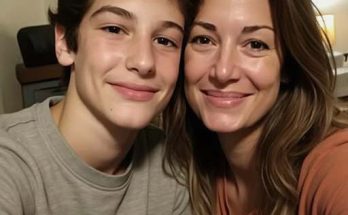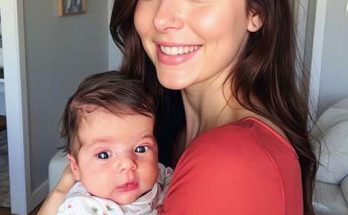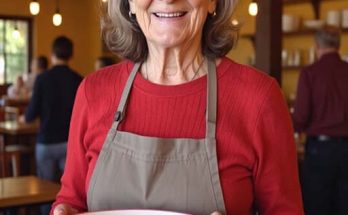I never knew a little act of compassion would have such a big impact.
I delivered a warm sandwich and coffee to the silent guy at the ancient church steps every morning. He requested nothing. He nodded, thanked me gently, and drank his coffee like it was his one bright spot.
I did that for years.
Ad
Twelve strangers entered my wedding with unexpected stories on my happiest day. a statement that brought tears to the room.
Explaining what occurred.
Every morning for years, Claire traveled the same way to the little café where she worked. I stopped near Maple and 3rd Street to start my morning.
It was Henry’s seat.
Under the ancient church steps’ awning—always there. He never requested funds. Never waved cardboard signs. Sitting silently, hands folded, gaze steady yet faraway. He was passed by most.
But I saw him.
Since I worked at a bakery, I thought of bringing him breakfast.
It started as leftovers. The croissant. A muffin. Paper-bagged heated sandwich. I would deliver it to him, he would nod softly, and I would go. No words. No awkwardness. Just compassion.
Then I brought two cups of coffee one cold morning.
Eventually, he spoke.
He murmured, “Thank you,” quietly, clutching the cup with both hands. “You always remember.”
He had a raspy voice from inactivity.
I grinned. “I’m Claire. Hello, good to meet you.”
He nodded again. “Henry.”
Our conversations increased. A little chat. A grin. He stated he did carpentry by hand. Life has grown difficult. After losing a loved one and his house, the world stopped acknowledging him.
But I did.
I never overasked. I never pitied him. I brought food. Sometimes soup. Extra cake happened sometimes. I accidentally discovered his birthday and handed him a chocolate pie with a candle.
He was astonished.
He remarked, “No one’s done that in… a long time,” with wet eyes.
I rubbed his shoulder and added, “Everyone deserves to be celebrated.”
Years passed. My money and friends helped me launch a café after changing careers. Oliver, a lovely, witty bookworm who believed in second chances, proposed to me.
Even though my life was fuller, I visited Henry every morning.
Henry disappeared one week before my wedding.
His slot was vacant. His blanket, typically folded alongside him, was gone. No one had seen him when I inquired. A sandwich I left in case went untouched.
It concerned me. Deeply.
My wedding day was a bright day of flowers, laughing, and celebration. The garden had lanterns and lace. Everything was beautiful, but I still worried about Henry.
As the music began and I stood at the aisle edge, something unexpected occurred.
Guests made a noise. Twelve guys in button-up shirts and immaculate pants entered slowly. Almost all are older and carry little paper flowers.
Not on the guest list. No one was familiar.
However, they purposefully formed a queue behind the final row of seats. A tall, silver-haired guy grinned at me.
“Are you Claire?”
I nodded, bewildered.
He presented a beautifully folded letter in my name’s envelope. Henry requested our presence today. Standing in his place.”
My heart stopped.
“You knew Henry?”
A guy nodded. “We all did. In the shelter with him. Not many people spoke to him. Every morning visit, meal, every act of kindness, he spoke about you.”
I opened the letter gingerly.
“Dear Claire,
If you’re reading this, I missed your wedding. I wanted to watch you go down the aisle, but my time here was brief.
Please know that your compassion transformed my life. You never asked me my name or activities. Your treatment never made me feel broken. You just saw me. That was my only wish.
I met other forgotten people in the shelter. I mentioned you. About how a kind young lady gave me coffee every morning and made me feel human again.
I asked them to fill in for me if I couldn’t. Because someone like you deserves to know your kindness’s reach.
Claire, I have little. I leave you with this gift: the knowledge that your muffins, laughter, and time touched souls you never knew.
My sincerest thanks,
Henry”
I cried. Neither could anybody else.
Twelve guys in their finest came with hand-folded paper flowers with notes of appreciation for me. Notes reading:
“You reminded me I mattered.”
Henry stated your thoughtfulness gave him hope. He gave it to us.”
“Thank you for seeing someone most people ignored.”
They stood quietly while Oliver and I exchanged vows. A table was reserved for them during the reception. Even though they spoke nothing, their presence conveyed everything.
The shelter Henry stayed in was visited later. The workers informed me he was a silent mentor. He helped people settle in, taught them to create modest furniture from leftover wood, and constantly mentioned the “girl from the café.”
One employee told me, “He said you saved his life.” “But more than that, you reminded him that love still exists.”
I left the shelter with his letter in my heart, tears in my eyes, and a calm determination.
Henry was gone, but his legacy was growing.
That’s when I knew his narrative continues.
Mine to continue.
My wedding was three years ago. Twelve strangers entered my life three years ago, bearing the silent legacy of a guy most people never noticed—a man I used to deliver breakfast to every morning.
No day passes by without thinking about Henry.
A change occurred after the wedding. It was now about what Henry had left me, not what I accomplished for him. His letter, memories, and the twelve guys shaped who I was. They reminded me that compassion isn’t disposable. What ripples, multiplies, echoes.
My new ritual began.
Every Friday morning, I host “Henry’s Hour” at the café. Free food and coffee are available to anybody who wanders in from 7 to 8 a.m. Some enter shivering, others ashamedly mute. Some conversation. Some don’t. That’s OK.
Henry would sit calmly, I recall. Minimal needs. Seeking attention.
My wedding picture of one of the twelve guys smiling sweetly beneath the floral arch was framed with his note.
Rose was an early regular. She usually wore a bright pink scarf and mismatched gloves and looked sixty. I never questioned her why she was out on the streets. She always cleaned her table before leaving, folding the napkin gently.
She once put a message beneath her empty coffee cup. It said, “Thank you for letting me sit where the world doesn’t push me away.”
My “Hope Jar” behind the counter had that message and others. Jar was filled soon. Then overflow. By the entryway, I pinned them on a corkboard. Customers stopped to read them. Some left their own.
A teenage teenager sat in the corner with his hoodie down one morning. I gave him a warm lunch and added, “This one’s on Henry.”
He raised eyes. “Who’s Henry?”
I grinned. Someone who showed me everyone has a story worth hearing.”
The youngster didn’t say anything, but returned the next week. And then. He eventually helped me clean tables and replenish sugar jars. His name was Marcus. He ran away from a bad foster family at sixteen.
“I just needed somewhere to breathe,” he said.
Marcus works weekends at the café. Customers are greeted quietly confidently. Henry could have liked him.
A letter with no return address arrived a few months after the wedding. A polished, smooth wooden rocking chair picture with a letter was inside:
“Made by hands you supported.”
Gordon, one of the twelve wedding men, signed it simply. I knew his sweet voice and compassionate gaze. Later, I learned that Henry taught him to carve again during their shelter evenings. That chair is presently near our fireplace. I sense Henry’s presence as I rock my daughter to sleep.
I’m a mother.
Hope was her name. Henry handed me it after all. Not only a narrative or letter, but a new perspective. Regaining faith in humans.
Oliver and I made a modest commitment the night she was born: to raise her with caring eyes, hearts, and hands.
Every night before bed, I tell her tales. No fairy tales. True tales. About Henry, a homeless guy with more elegance than anybody I’d encountered. About how being nice is about walking with someone, not changing them.
She watches folks from the café window sometimes. Like I watched Henry. I suppose she knows despite her little size.
The seat outside the café with the statement “In honor of Henry — who showed us that the smallest kindness can echo forever” is a landmark.
People weep when sitting. Say a prayer. Contact someone via phone. Take a breath.
A drenched young lady was curled up on the bench one rainy morning. She got a towel and tea from me.
“I wasn’t going to stay long,” she added, ashamed.
“You can stay as long as you need,” I informed her.
She had a failed job interview in town. Not pals. No cash. Just awful timing.
Her name was Natalie. She volunteered at the café for food for a few days. She was compassionate and had a keen eye. She was the first to smile at apprehensive new customers.
A floral client down the street hired her within a week. Housing over the shop. Through sobs, Natalie embraced me and murmured, “That bench saved me.”
No, not the bench.
It was Henry.
I kept in contact with several of my twelve wedding guys.
Gordon sells his wood sculptures at Saturday markets.
After 10 years, Luis discovered his daughter and teaches painting at a community center.
Samuel, who earned a diploma in addiction treatment at 57. He volunteers at the shelter every Thursday.
They usually say, “It began with Henry.” It grew with you.”
I believe it’s still increasing.
The café presented a candlelit Christmas feast last year. For anybody who wanted a warm dinner or companionship, free. We dubbed it “Henry’s Table.”
I put twelve seats at the central table.
Even though only seven candles were lit that night, the other five blazed brilliantly.
A lady approached me late at night. Her clothing was old, her hands rough, yet her voice was solid.
“Did you know Henry?” she inquired.
My heart tugged as I nodded.
She grinned. “He was my brother.”
Oh, I gasped.
“His real name was Henry Lane,” she whispered. He vanished when my sister-in-law died. He refused to be located but was looked for. Said the world didn’t need damaged people.”
I cried nonstop.
“He wrote to me once,” she said. Mentioned a girl who gave him candle-lit pie. Said she saw his working parts.”
I showed her the bench. The Hope Jar. The wedding picture.
We clasped like sisters, pain and gratitude intertwined.
Café is more than a business. A refuge. A refuge. A place where compassion is hidden amongst commonplace things.
A consumer may linger at the corkboard to read remarks in various hands:
“You gave me breakfast when I was hungry.”
“Your smile told me I wasn’t invisible.”
“I found my way back because someone believed I could.”
On certain days, I observe from behind the counter. Henry used to sit and observe the world. What would he think now?
Could he believe his beginnings?
Does he think one calm life may start a chain of tiny miracles?
He probably would.
Because he believed in people despite their doubts.
Now, whenever someone fresh sits on that bench… Each folded handwritten message placed in the Hope Jar… When children ask their parents, “Who’s Henry?”…
His legacy endures.
Not as a park statue or plaque.
With paper flowers. In second chances. Sharing warm coffee with strangers. I hear my daughter chuckle.
I occasionally envision Henry smiling on the bench when I open the café in the morning. And I murmur, ‘I still remember.’
Henry left no wealth or renown.
His legacy was greater.
Proof that peaceful, gentle, undemanding love can alter the world.
Muffin by muffin.
Dedicated to hidden heroes. For silent donors. And to recipients, honor. Let’s all discover Henry in ourselves and pass it on.



